Pescatarian Diet: Benefits, Foods To Eat & 7-Day Meal Plan
Enjoy the incredible advantages of including heart-healthy fish and seafood in your diet.
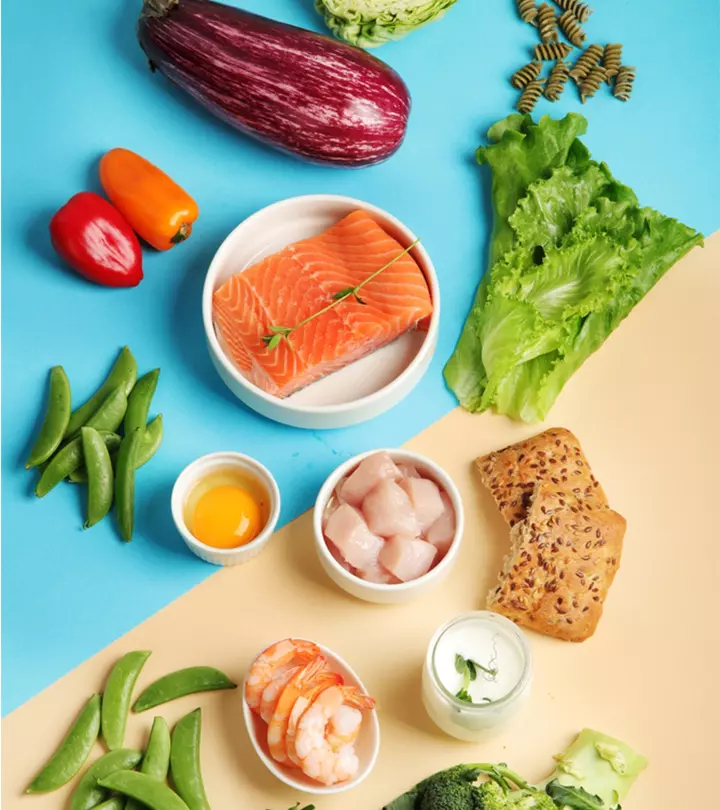
Image: Shutterstock
A pescatarian diet is ideal for those who want to incorporate more plant-based foods in their diet but are not ready to omit all animal products. But this is not the only reason why people may choose this diet plan. Some may follow it to enjoy the health benefits, while others may follow it to curb the environmental impact of eating meat. For others, choosing fish over red meat and poultry may be just a matter of taste and preference.
Irrespective of the reason, a diet consisting mainly of plant-based foods has various health benefits, and seafood addition may enhance them. In this article, we will look at these benefits along with what you should eat and avoid while on a pescatarian diet. Keep reading!
 At A Glance: Pescatarian Diet
At A Glance: Pescatarian DietPrinciple: A diet that focuses on the consumption of plant-based foods and incorporates fish and seafood as the main source of animal protein.
Purpose: To develop sustainable yet healthy eating habits.
Who It Is For: Anyone who wishes to add more protein to their plant-based diet or wants to stop consuming red meat and poultry.
Duration: Long-term
Who Should Avoid: People with seafood allergies.
Cons: May lead to mercury toxicity.
In This Article
What Is A Pescatarian Diet?
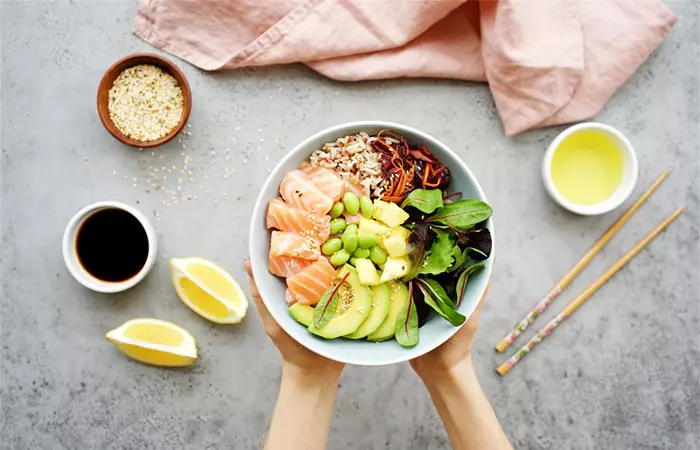
A pescatarian diet combines a vegetarian diet with fish and seafood. It is a sustainable diet and excludes other meats like poultry, beef, and pork. A person following this diet mainly consumes plant-based foods like vegetables, fruits, grains, and legumes while incorporating fish and seafood for protein and essential Omega-3 Fatty Acidsi Healthy, polyunsaturated fats in foods like fish, flaxseeds, and walnuts known for supporting heart and brain health. . However, the inclusion of eggs and dairy depends upon individual preference.
 Did You Know?
Did You Know?
Adding fish and seafood to a vegetarian diet ensures that you get all the nutrients your body needs for proper functioning. The next section highlights the major health benefits of a pescatarian diet. Keep reading.
Key Takeaways
- A pescatarian diet is the nutritional practice of adding seafood to a vegetarian diet of vegetables, fruits, and whole grains. Some pescatarians may also consume dairy and eggs as a personal preference.
- The diet may help fight infections like COVID-19, aid in weight loss, and reduce the risk of cardiovascular diseases.
- Pregnant and lactating women and children should follow this diet with caution, as some high-mercury fish like king mackerel and tuna may lead to mercury toxicity.
Health Benefits Of A Pescatarian Diet

1. May Reduce Cancer Risk
According to a study, a person following this diet may have a lower risk of developing Prostate Canceri A tumor of the prostate gland, a part of the male reproductive system that includes symptoms like difficulty with urination. and Colorectal Canceri A tumor that develops in the colon or rectum and is characterized by common symptoms like blood in the stool and constipation. (1). This might be due to the greater consumption of whole grains, vegetables, and fruits (2). However, further research is required in this area.
2. May Help Fight Infections
This diet may help fight off infections and may have a protective effect against COVID-19. According to a study published in the journal BMJ Nutrition, Prevention & Health, people who followed the pescatarian diet had 59% lower chances of getting moderate or severe COVID-19 and similar infectious conditions. This is because the diet is nutrient-dense and consists of little to no poultry and no processed meat (3).
3. May Promote Heart Health
The pescatarian diet is associated with a lower chance of having high cholesterol and high blood pressure, both of which increase the risk of heart problems. Fish and seafood are rich in omega-3 fatty acids that help maintain heart functions and have cardioprotective effects (4), (5). However, further studies are needed to determine optimal dosing for the same.
4. May Aid In Weight Loss
Fish and seafood are an excellent source of protein, which should be an essential part of your weight loss journey. They are low in saturated fats and adding them to a nutritionally balanced diet may help reduce weight (6), (7).
Additionally, the diet contributes to reduced greenhouse gas emissions, making it climate-friendly (8). A pescatarian diet is not just healthy but is also manageable. Read the following section to find out what foods to eat and avoid on this diet.
Foods To Eat And Avoid On A Pescatarian Diet
A person following a pescatarian diet can eat a wide range of foods that contribute to a balanced nutrient profile for optimal health. Here is the pescatarian food list you can follow:
| Foods To Eat | Foods To Eat (Optional) | Foods To Avoid |
|---|---|---|
| Various types of fish and shellfish such as salmon, tuna, shrimp, crab, and scallops. | Eggs | All forms of red meat, including beef, pork, and lamb. |
| Plant-based sources of protein such as tofu, tempeh, edamame, beans, and legumes. | Dairy products like yogurt, cheese, and milk. | Processed meats like bacon and sausages. |
| All kinds of fruits and vegetables. | Poultry products like chicken and turkey. | |
| Whole grains such as brown rice, quinoa, oats, and barley. | Animal byproducts like gelatin and lard. | |
| Nuts and seeds like almonds, walnuts, chia seeds, and flaxseeds. | ||
| Dairy-free alternatives like almond milk, soy milk, or coconut yogurt. | ||
| Healthy fats like olive oil and avocado oil. | ||
| Herbs, spices, and seasonings like basil, oregano, turmeric, cumin, thyme, and paprika. |
Now that you know what exactly to buy while on this diet, discover some delicious pescatarian meal ideas in the following section for simple meal planning and preparation.
A 7-Day Pescatarian Meal Plan
Here is a sample 7-day pescatarian meal plan you can follow:
Day 1
| Meal | What To Eat |
|---|---|
| Breakfast | 3 oz of smoked salmon and 1 cream cheese bagel |
| Snack | 2-3 small slices of cottage cheese and 1 cup of pineapple. |
| Lunch | 1 bowl of black bean and corn salad |
| Snack | 1 kiwi and a handful of nuts |
| Dinner | 2 fish tacos with 1 cup of cabbage coleslaw |
Day 2
| Meal | What To Eat |
|---|---|
| Breakfast | 1 vegetable omelet with 1 tablespoon of homemade ketchup |
| Snack | 1 apple with 1 tablespoon of peanut butter |
| Lunch | 3 oz of grilled tuna steak with a handful of potato fries and ½ cup of sautéed greens |
| Snack | A handful of mixed nuts and dried cranberries |
| Dinner | 3 oz of baked cottage cheese with ½ cup of brown rice and 1 cup of green salad |
Day 3
| Meal | What To Eat |
|---|---|
| Breakfast | 1 cup of peanut butter overnight oats |
| Snack | ½ slice of mango and a handful of cashews |
| Lunch | 1 bowl of quinoa and red bean salad |
| Snack | 1 cup of baked beetroot chips |
| Dinner | 3.5 oz of baked tofu with steamed asparagus |
Day 4
| Meal | What To Eat |
|---|---|
| Breakfast | 1 cup of Greek yogurt parfait |
| Snack | 2 whole-grain crackers |
| Lunch | 2 spinach and feta-stuffed bell peppers |
| Snack | 1 small pear |
| Dinner | 1 cup of vegetable stir-fried rice with ½ cup of Greek yogurt |
Day 5
| Meal | What To Eat |
|---|---|
| Breakfast | 2 scrambled eggs with spinach |
| Snack | 1 apple (sliced) with 1 tablespoon of nut butter |
| Lunch | 3-5 vegetable sushi rolls |
| Snack | 5-7 Carrot sticks with 1 tablespoon of hummus |
| Dinner | 1½ cups of coconut fish curry and rice with 1 cup of sautéed vegetables |
Day 6
| Meal | What To Eat |
|---|---|
| Breakfast | 1 whole-grain avocado toast with 1 poached egg |
| Snack | 1 bell pepper (sliced) with 1 tablespoon of tzatziki sauce |
| Lunch | 2 cups of Mediterranean salad |
| Snack | A handful of almonds and dried apricots |
| Dinner | 2 cups of lentil vegetable soup |
Day 7
| Meal | What To Eat |
|---|---|
| Breakfast | 1½ cups of walnut and banana oatmeal |
| Snack | 1 sliced cucumber with a tablespoon of hummus |
| Lunch | 1 black bean and chickpeas burrito bowl |
| Snack | 1 cup of Greek yogurt with one fruit of your choice |
| Dinner | 1 bowl of tuna salad |
This pescatarian meal plan is merely a sample. It is best to consult a nutritionist to get a customized and balanced plan so that you do not miss out on important nutrients. You can also adjust it according to your dietary choices, limitations, and fitness goals. If losing a few extra pounds is your goal, check out the next section for a sample pescatarian diet plan for weight loss.
Pescatarian Diet Plan for Weight Loss
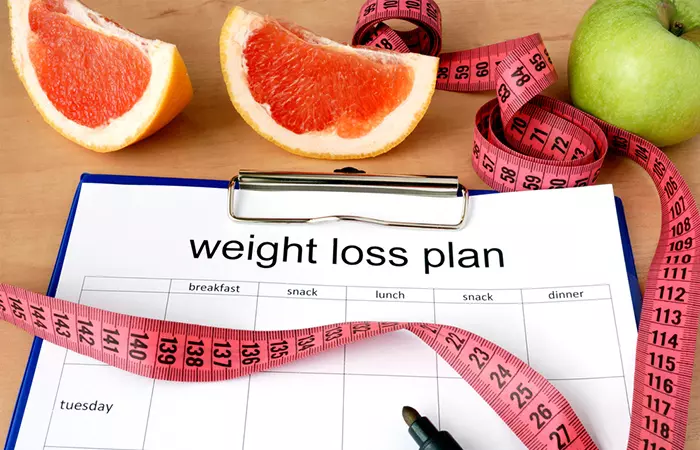
A pescatarian diet can support weight loss, as it mainly comprises nutrition-dense, plant-based foods. Here’s a sample pescatarian diet plan for weight loss with multiple food combinations for you to pick from:
| Meal | What To Eat |
|---|---|
| Breakfast |
|
| Snack |
|
| Lunch |
|
| Snack | 1 small apple/pear/orange + 1 cup of green tea |
| Dinner |
|
You can follow this diet plan or combine it with your personal pescatarian weight loss meal plan after consulting a nutritionist. While adding any pescetarian recipes to this plan, always ensure to opt for grilling, baking, steaming, and sauteing over frying.
Want some food inspiration? Scroll down to see some quick, lip-smacking, and healthy pescatarian recipes you can prepare at home.
Pescatarian Diet Recipes
1. Shrimp Burrito Bowl
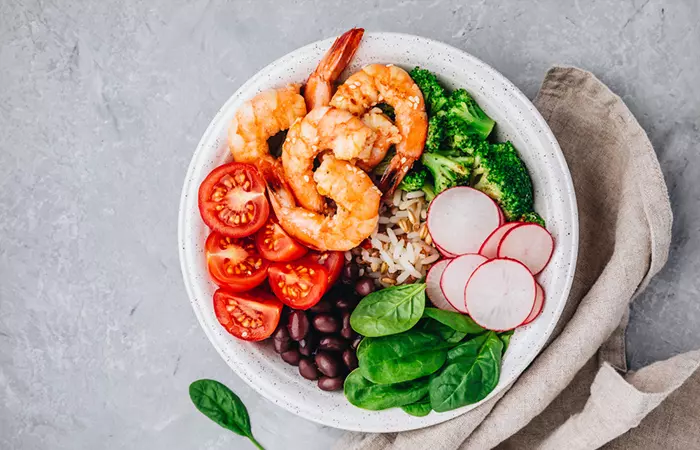
Ingredients
- 8 oz of raw jumbo shrimp
- ½ tablespoon of taco or fajita seasoning
- ½ cup of broccoli, chopped
- ½ radish, sliced
- 3-5 cherry tomatoes
- ½ cup of baby spinach
- 1 tablespoon of lime juice
- ½ cup of black beans, boiled
- ½ cup of cooked brown rice
- 1 tablespoon of olive oil
How To Prepare
- Marinate the shrimp with taco/fajita seasoning and keep aside.
- Set a non-stick skillet on medium-high heat and spray olive oil in it.
- Toss in the broccoli, baby spinach, or any other vegetables of your choice and stir-fry for a minute.
- Add fresh lime juice and transfer the cooked veggies to a bowl.
- Add some more olive oil to the skillet and toss in the shrimp.
- Cook for 3-5 minutes or until the shrimp has seared edges.
- Transfer it to your bowl of veggies and add some cooked brown rice.
- Top up with some chopped radish and sliced cherry tomatoes, and enjoy!
 Quick Tip
Quick Tip2. Coconut Fish Curry
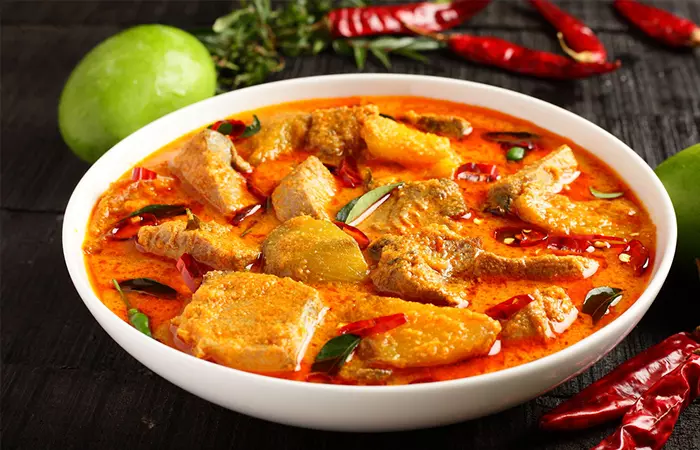
Ingredients
- 2 tablespoons of coconut oil or olive oil
- 5.6 oz of wild halibut
- 2 white onion, diced
- 1 tablespoon of garlic, minced
- 1 tablespoon of fresh ginger, grated
- 4 tomatoes, sliced
- 1 lemon
- 2 teaspoons of curry powder
- 1 teaspoon of chili powder
- 1 can of coconut milk
- 8-10 curry leaves
- 1 teaspoon of sea salt
- ½ teaspoon of pepper
How To Prepare
- Set a skillet on high heat and add a tablespoon of coconut or olive oil.
- Toss in the halibut and cook on each side until its edges turn brown.
- Remove the fish from the skillet.
- Add another tablespoon of coconut or olive oil and toss in the onion, garlic, ginger, and curry leaves.
- Saute for 3 minutes until the onions turn slightly brown.
- Add the tomatoes and continue cooking and stirring for 3-5 minutes.
- Add curry and chili powder and cook for a minute.
- Squeeze in some lemon juice and add coconut milk.
- Reduce the heat to low, cover the skillet, and let the sauce cook for 10 minutes.
- Season to taste with sea salt and pepper.
- Add the fish to the sauce and cook for 5-8 minutes.
- Serve with rice and grilled vegetables.
These recipes are easy to prepare, satisfying, and delicious. The recipes are a great way to add vegetables to your diet with lean protein. In one way, the pescatarian diet is more like a lifestyle. It is quite similar to the Mediterranean and the vegetarian diet, as all three dietary patterns focus on excluding red meat and poultry. However, they are different in many aspects. The next section highlights the similarities and differences between these diets. Keep reading.
Decoding Pescatarian, Mediterranean, & Vegetarian Diets
Pescatarian Vs. Mediterranean Diet
The Mediterranean diet is inspired by the traditional eating habits of people in countries bordering the Mediterranean Sea. It favors the usage of olive oil as the primary fat source, a high consumption of plant-based foods, moderate consumption of fish and poultry, and limited consumption of red meat.
The pescatarian diet shares many similarities with this diet, as both focus on fruits, vegetables, and whole grains. However, unlike the Mediterranean diet, the pescatarian diet food list does not include meat and poultry. Another key difference between both diets is the use of olive oil. While the Mediterranean diet emphasizes olive oil consumption, the oil is not a key component in the pescatarian diet.
However, like the pescatarian diet, the Mediterranean diet promotes heart health (9). Since both these diets are somewhat similar and emphasize the importance of plant-based foods, choose what works best for you. If you enjoy lean chicken and do not like fish and seafood, choose the Mediterranean diet or vice versa.
Whichever diet you choose, ensure it is balanced and meets your dietary requirements. You can follow the same rule while choosing between a vegetarian or a pescatarian diet, which we have compared in the following section.
Pescatarian Vs. Vegetarian Diet
The pescatarian diet has a lot in common with the vegetarian diet. Both include fruits, vegetables, nuts and seeds, whole grains, beans, and lentils, and stay away from meat. But there is a way in which the pescatarians part company from vegetarians – they eat fish and other seafood.
A vegetarian or plant-based diet involves a lower intake of saturated fats, which, in turn, may help lower LDL (bad) cholesterol and reduce the risk of heart disease. It also includes foods with high dietary fiber that may help lower the risk of gastrointestinal disorders (10). Since both vegetarian and pescatarian diets are plant-based, they offer similar benefits.
However, following only a plant-based vegan diet may lower the average plasma concentration of vitamin B12 (10). This is where adding fish to your diet may be beneficial. Studies state that including salmon fish protein supplements in your diet for eight weeks may help increase vitamin B12 levels (11).
Both vegetarian and pescatarian diets are healthy if you follow the basic principles of including whole, nutrient-dense foods instead of fried and processed foods. If you are ethically okay with eating fish, include it in your daily diet in moderation. If not, you may always choose plant-based protein sources like tofu or consult your doctor for supplement recommendations.
While the pescatarian diet has numerous health benefits and offers flexibility in meal planning and preparation, this one too, just like all other diets, has its own set of risks. Check them out in the next section.
Disadvantages Of A Pescatarian Diet
1. May Increase The Risk Of Mercury Poisoning
Fish and seafood carry a greater risk of mercury contamination. The symptoms of mercury poisoning are often mistaken for medical issues like gastritis and respiratory distress, leading to a wrong diagnosis. Excessive mercury exposure may have toxic effects on the body and may also damage the central nervous system and lead to coma and death (12),(13).
Since children and fetuses are highly susceptible to mercury toxicity, the FDA recommends that pregnant or breastfeeding women and children should avoid consuming high-mercury fish like king mackerel and tuna. They may eat freshwater fish like pike and bass in moderation (12).
2. May Not Be Ethically Sustainable
Pescatarianism is often considered more ethical compared to meat and poultry based diets. However, the issues regarding fish and seafood are quite different from meat. Aquatic and marine fishes are often harvested for food production and fish farming may not be an ethical practice. There are concerns regarding the deprivation of natural behavior, breeding, etc. On the other hand, wild fishing may lead to overfishing and pose a risk to the aquatic system (14).
Other than these concerns, the diet may be against people’s ethical beliefs as you are still eating animals (15). The only alternative to this is adding plant-based proteins like lentils, soy, tofu, and tempeh to your diet.
Furthermore, seafood, especially wild-caught varieties that are more nutritious, can be expensive, and so can fresh foods such as vegetables, fruits, and fish (16).
3. Potential Nutritional Concerns
It has been seen that some people on a pescatarian diet may need to monitor their intake of iron and vitamin B12, commonly derived from animal products (16). Pescatarians can incorporate fortified foods such as iron-fortified cereals, which can provide up to 100% of the recommended daily allowance of iron. For Vitamin B12, they can opt for plant-based milk alternatives fortified with vitamin B12, and nutritional yeast, a popular vegan source of vitamin B12. In some cases, supplementation may be necessary to ensure adequate intake of these essential nutrients.
Always remember that it is important to consult with a healthcare professional or dietician before making significant changes to your diet. This will help you get the most out of your chosen diet while avoiding its disadvantages.
The pescatarian diet is perfect for you if you want to add more protein and healthy nutrients to your plant-based diet. While the diet allows you to consume a variety of fish and seafood, keep in mind that it is not an all-fish diet. In order to make it balanced, you may have 2 to 4 fish or seafood meals per week. The remainder of your meals should be plant-based. Also, avoid sweets and processed foods if you aim to lose or maintain weight on the pescatarian diet. In addition to this, follow healthy lifestyle practices like exercising regularly, drinking adequate water, and ensuring proper sleep.
Infographic: Everything You Should Know About The Pescatarian Diet
The pescatarian diet combines the health benefits of a vegetarian diet with the addition of seafood. It is a flexible and health-conscious choice that is perfect for anyone who wants to give up on meat consumption or add more protein to their plant-based diet. The following infographic will take you through everything you need to know about the pescatarian diet. Check it out!
Some thing wrong with infographic shortcode. please verify shortcode syntax
Frequently Asked Questions
Do pescatarians eat bread?
Yes, pescatarians eat all types of bread including multigrain, oat-based, and whole-wheat bread. However, if you are on a pescatarian low-carb diet, avoid white bread.
Which is healthier – a vegan diet or a pescatarian diet?
While both vegan and pescatarian diets are healthy, studies state that vegans are at risk of developing lower concentrations of vitamins B12 and D and calcium (10). Therefore, a pescatarian diet may be considered more nutritionally balanced and healthier.
Can children follow a Pescatarian diet?
Yes, children may follow a pescatarian diet. However, since children are highly susceptible to mercury toxicity, they should avoid high-mercury fish like tuna and opt for freshwater fish like bass in moderation (12). Always consult a pediatrician before starting a pescatarian diet.
Is a pescatarian diet suitable for athletes and active individuals?
Yes, a pescatarian diet may be suitable for athletes and active individuals, as it is a well-balanced diet that includes healthy proteins (from fish and plant-based proteins like tofu) and healthy fats, fiber, vitamins, and minerals (from plant-based foods).
Can I follow a pescatarian diet if I don’t like seafood?
No, you cannot follow a pescatarian diet if you do not like seafood, as seafood is an integral part of this diet plan and it is impossible to follow something long-term this way. Instead, choose a diet of your preference.
Is fish the only source of protein on a pescatarian diet?
No, fish is not the only source of protein on a pescatarian diet. You may also consume plant and animal-based sources of protein like dairy, egg, tofu, lentils, beans, nuts, seeds, and tempeh.
Illustration: Pescatarian Diet - What To Eat, Benefits, And Disadvantages
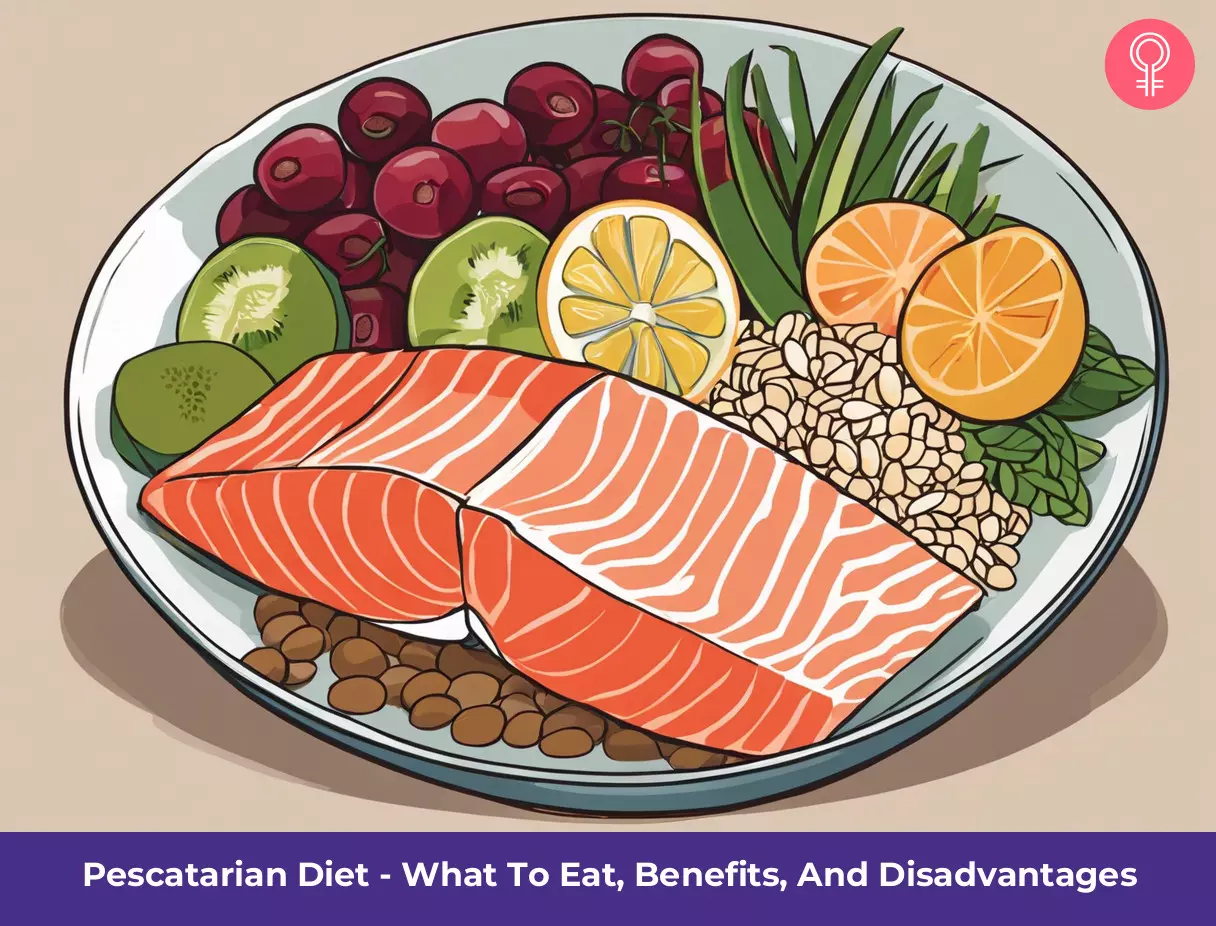
Image: Stable Diffusion/StyleCraze Design Team
Learn how to incorporate seafood into your diet for a healthier and more sustainable lifestyle with this video. Check it out and find out everything you need to know about the pescatarian diet.
References
Articles on StyleCraze are backed by verified information from peer-reviewed and academic research papers, reputed organizations, research institutions, and medical associations to ensure accuracy and relevance. Read our editorial policy to learn more.
- Association of meat, vegetarian, pescatarian, and fish-poultry diets with risk of 19 cancer sites and all cancer: findings from the UK biobank prospective cohort study and meta-analysis
https://pubmed.ncbi.nlm.nih.gov/35655214/ - Risk of cancer in regular and low meat-eaters, fish-eaters, and vegetarians: a prospective analysis of UK Biobank participants
https://bmcmedicine.biomedcentral.com/articles/10.1186/s12916-022-02256-w - Plant-based diets, pescatarian diets, and covid-19 severity: a population-based case-control study in six countries
https://www.ncbi.nlm.nih.gov/pmc/articles/pmc8219480/ - Vegetarian, pescatarian, and flexitarian diets: sociodemographic determinants and association with cardiovascular risk factors in a Swiss urban population
https://www.ncbi.nlm.nih.gov/pmc/articles/pmc7525113/ - A fish a day keeps the cardiologist away! – a review of the effect of omega-3 fatty acids in the cardiovascular system
https://www.ncbi.nlm.nih.gov/pmc/articles/pmc3712371/ - A highly saturated fat-rich diet is more obesogenic than diets with lower saturated fat content
https://pubmed.ncbi.nlm.nih.gov/20934605/ - Randomized trial of weight-loss-diets for young adults varying in fish and fish oil content
https://pubmed.ncbi.nlm.nih.gov/17502874/ - Designing nutritionally adequate and climate-friendly diets for omnivorous, pescatarian, vegetarian, and vegan adolescents in Sweden using linear optimization
https://www.ncbi.nlm.nih.gov/pmc/articles/pmc8398609/ - Definition of the Mediterranean diet: a literature review
https://www.ncbi.nlm.nih.gov/pmc/articles/pmc4663587/ - Plant-based diets and long-term health: findings from the epic-oxford study
https://www.ncbi.nlm.nih.gov/pmc/articles/pmc7613518/ - Salmon fish protein supplement increases serum vitamin b12 and selenium concentrations: secondary analysis of a randomized controlled trial
https://www.ncbi.nlm.nih.gov/pmc/articles/pmc9363293/ - Mercury toxicity
https://www.ncbi.nlm.nih.gov/books/nbk499935/ - Recognizing and Preventing Overexposure to Methylmercury from Fish and Seafood Consumption: Information for Physicians
https://www.hindawi.com/journals/jt/2011/983072/ - Animal Harms and Food Production: Informing Ethical Choices
https://www.ncbi.nlm.nih.gov/pmc/articles/PMC8146968/ - “It’s Still an Animal that Died for Me.” Responsibility and Meat Consumption
https://www.ncbi.nlm.nih.gov/pmc/articles/PMC7909192/ - Iron Status of Vegans, Vegetarians and Pescatarians in Norway
https://pmc.ncbi.nlm.nih.gov/articles/PMC8003004/
Read full bio of Eleana Kaidanian
Read full bio of Himanshi Mahajan
Read full bio of Ravi Teja Tadimalla
Read full bio of Moksha Gandhi








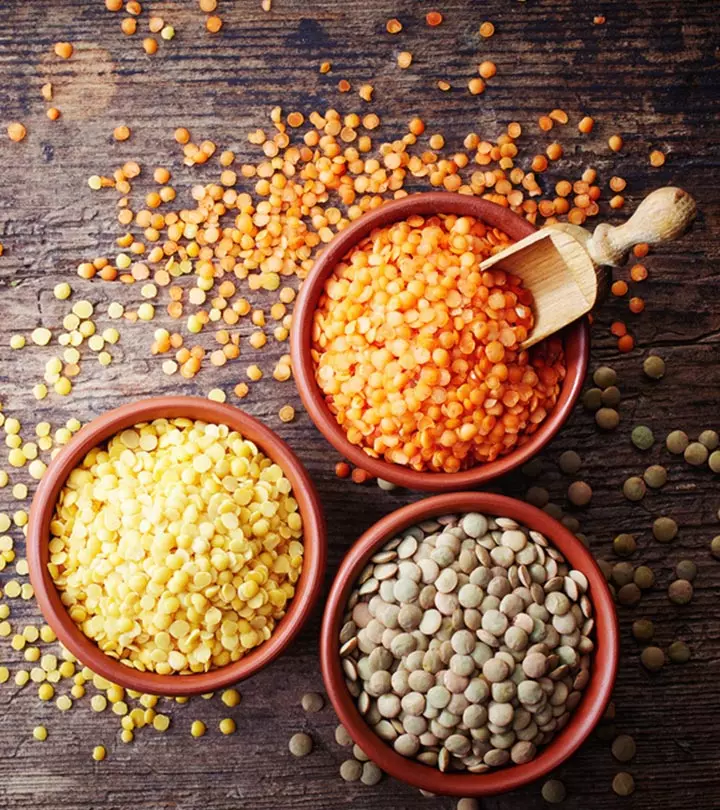
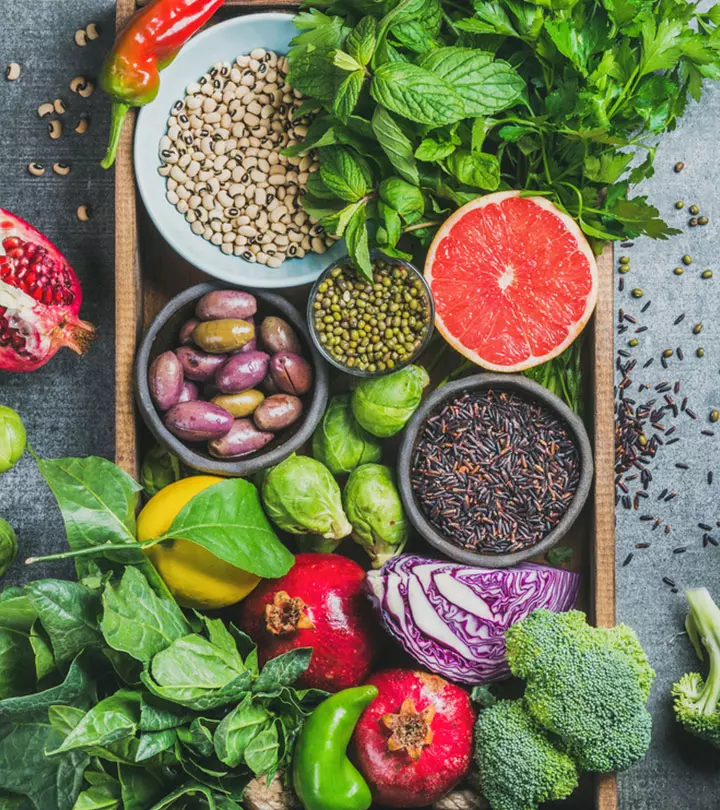
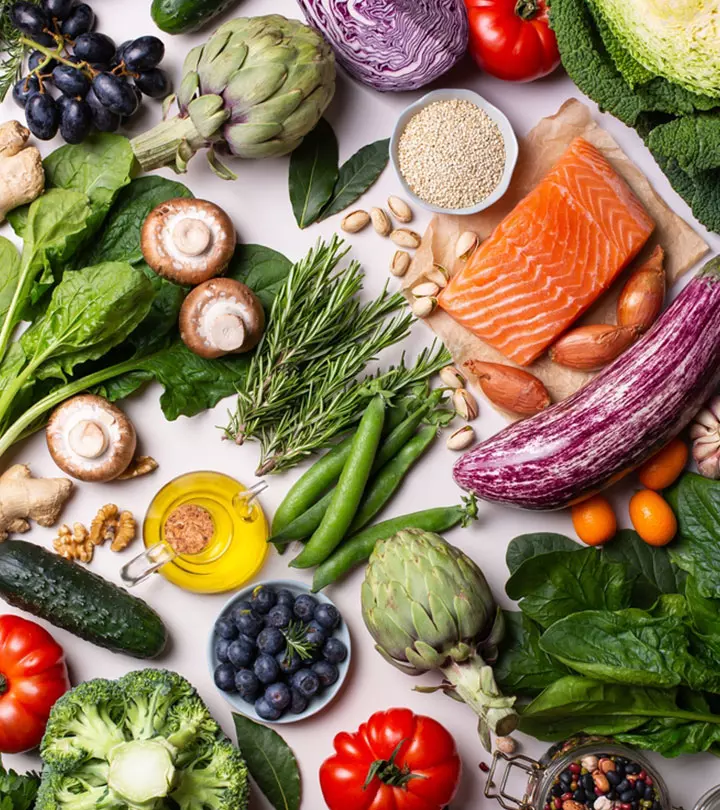
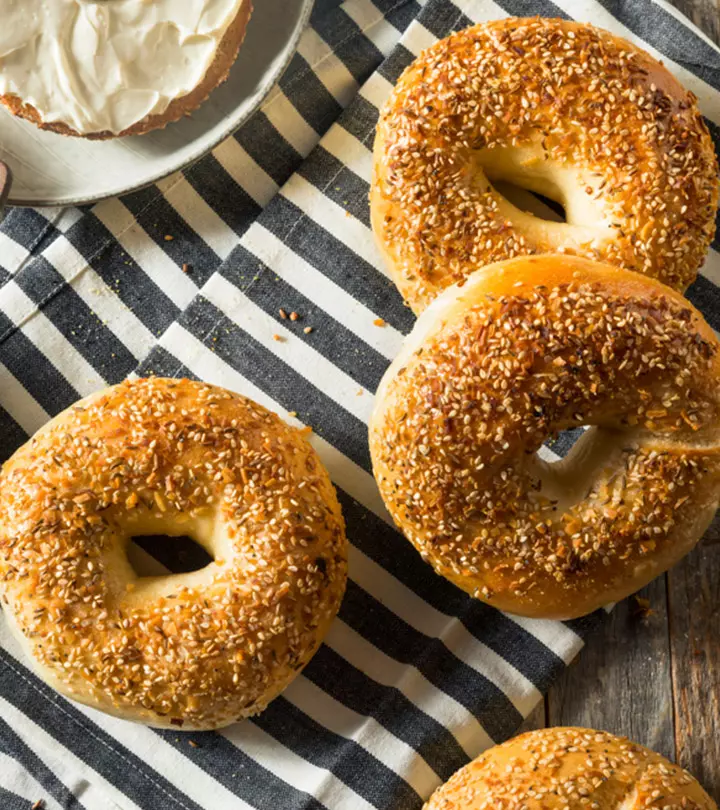
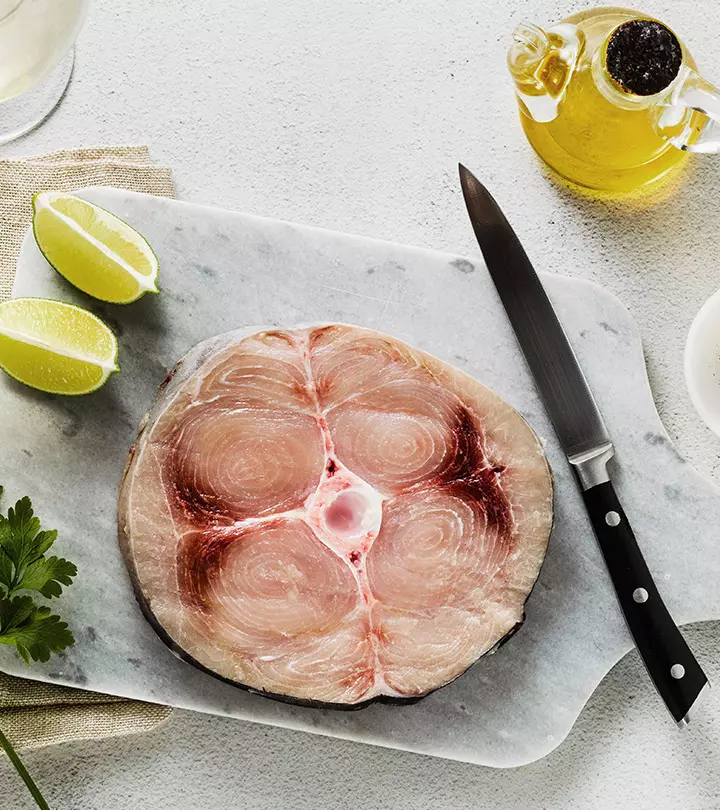
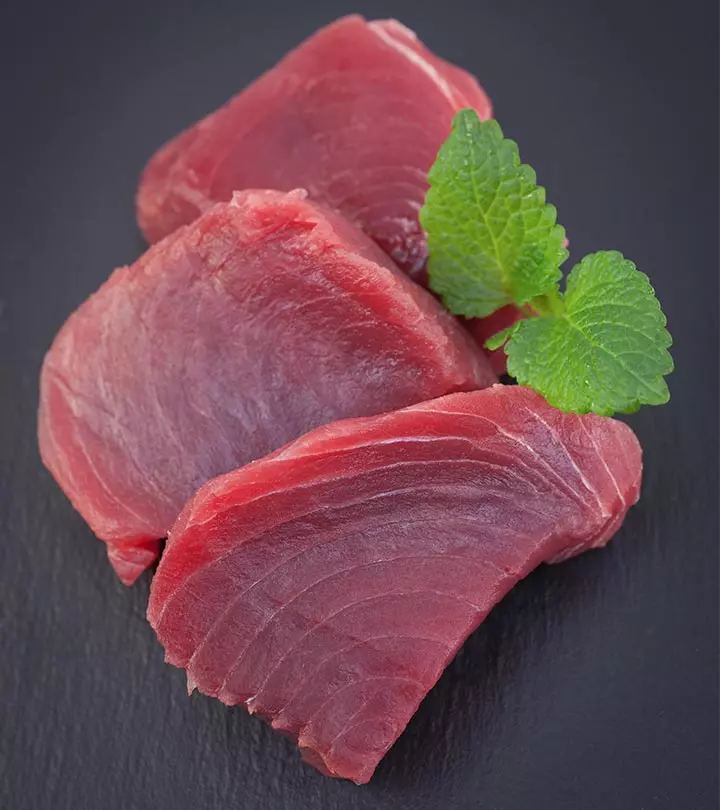
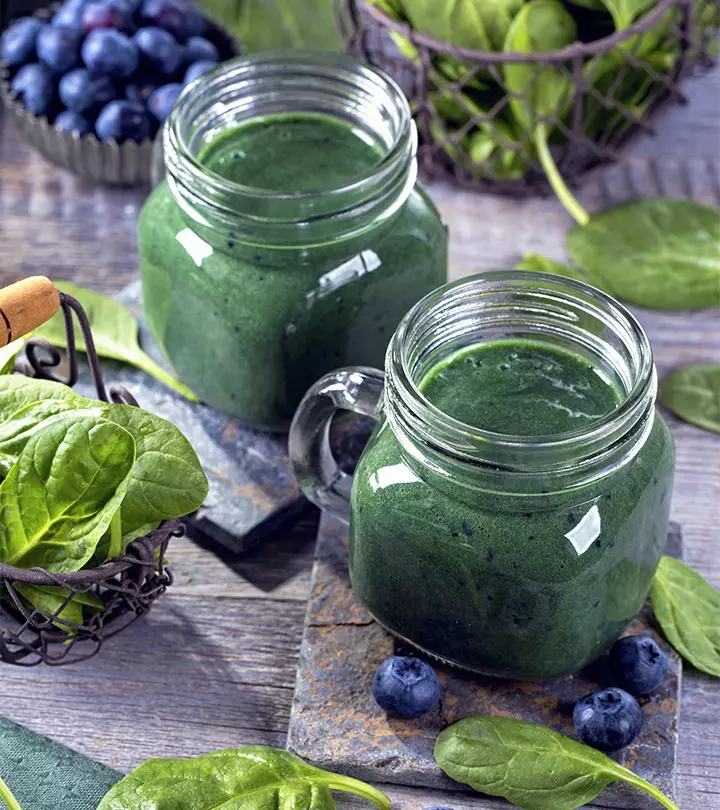



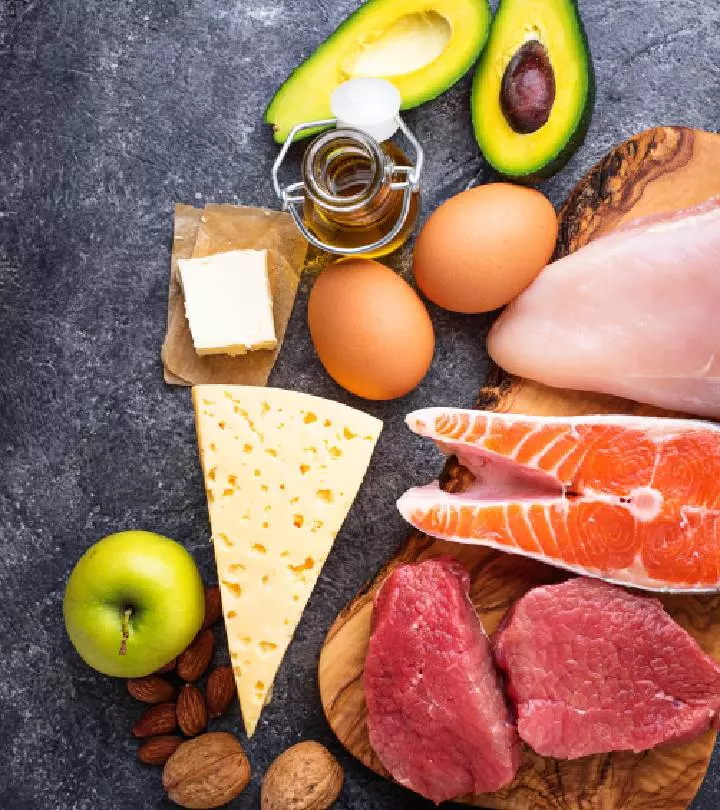
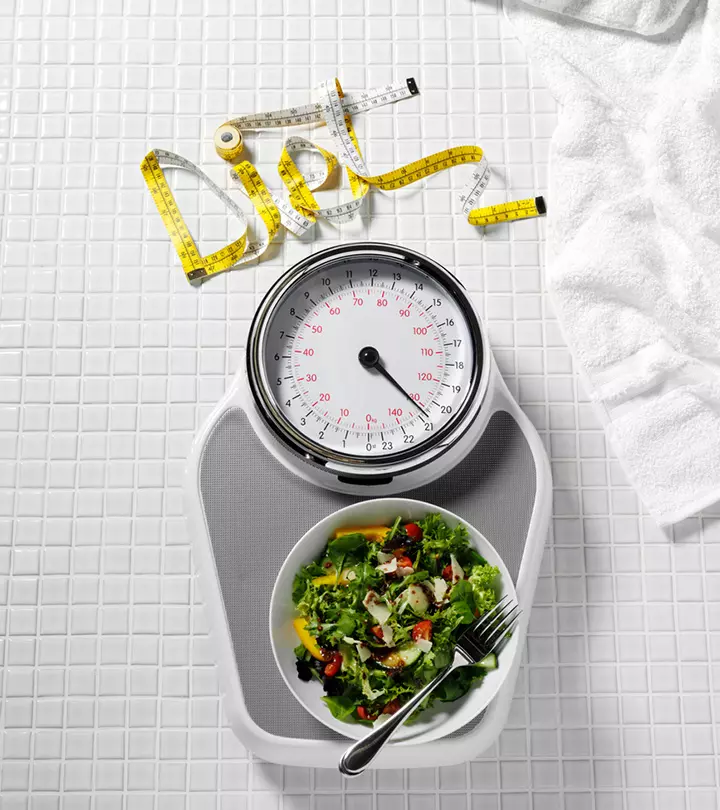


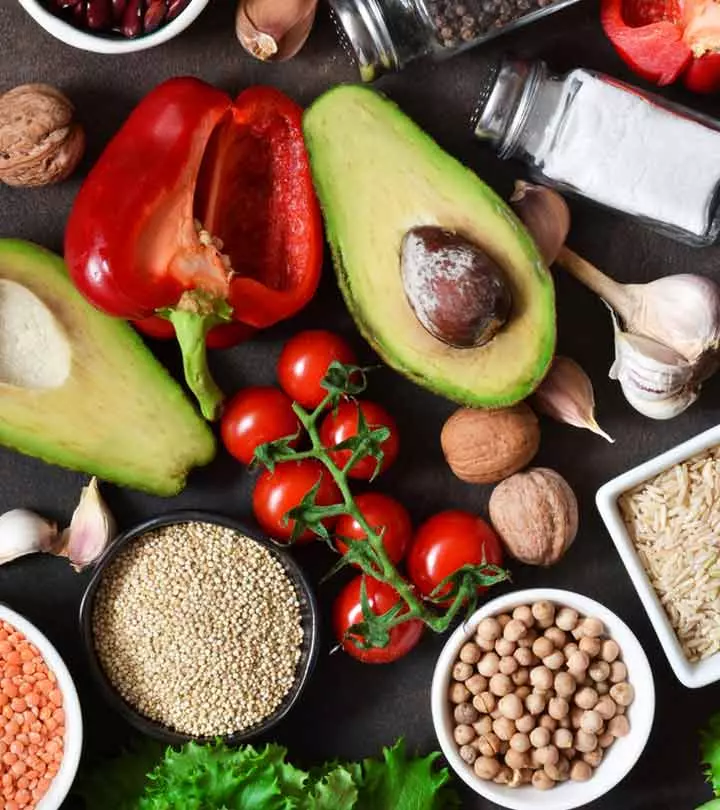

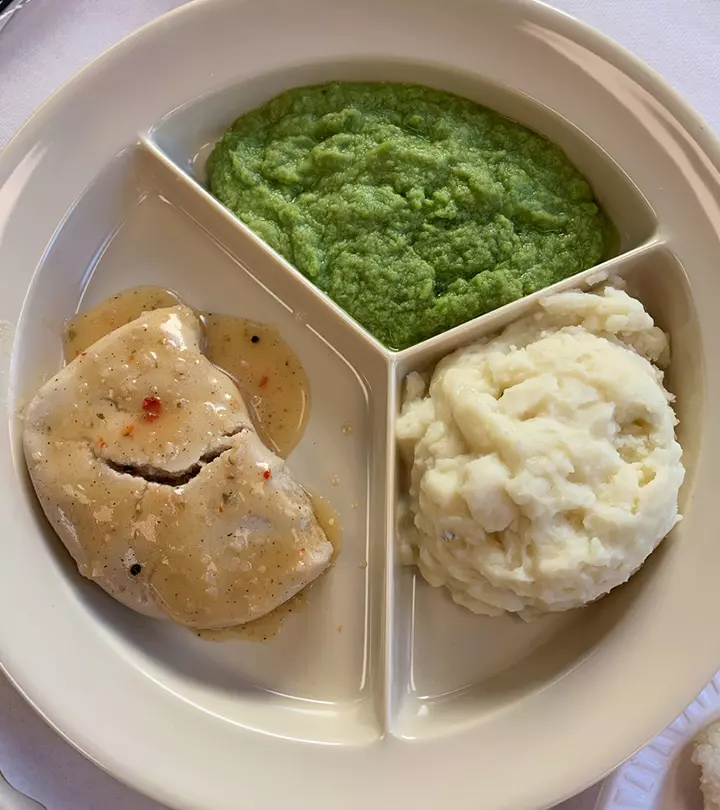

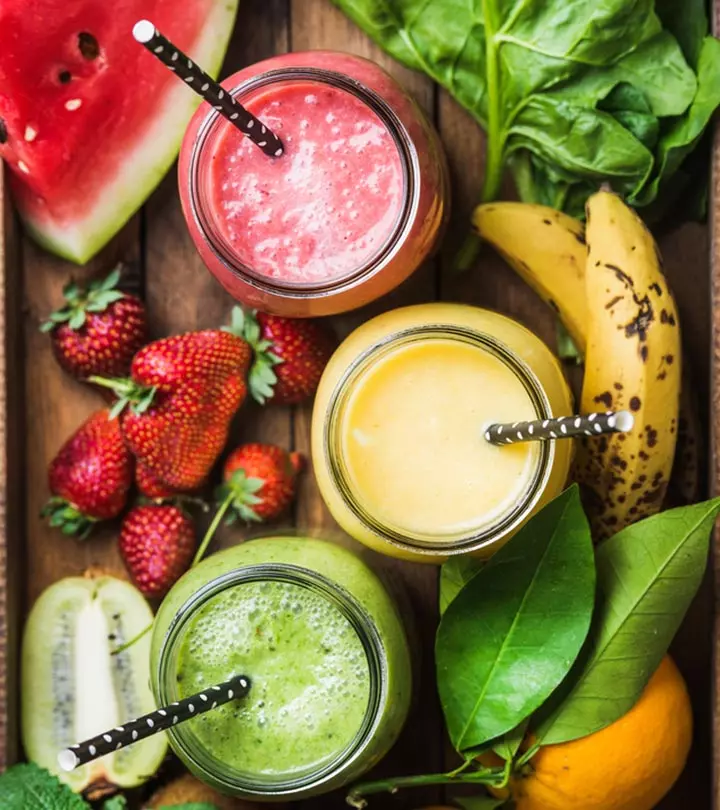
Community Experiences
Join the conversation and become a part of our empowering community! Share your stories, experiences, and insights to connect with other beauty, lifestyle, and health enthusiasts.